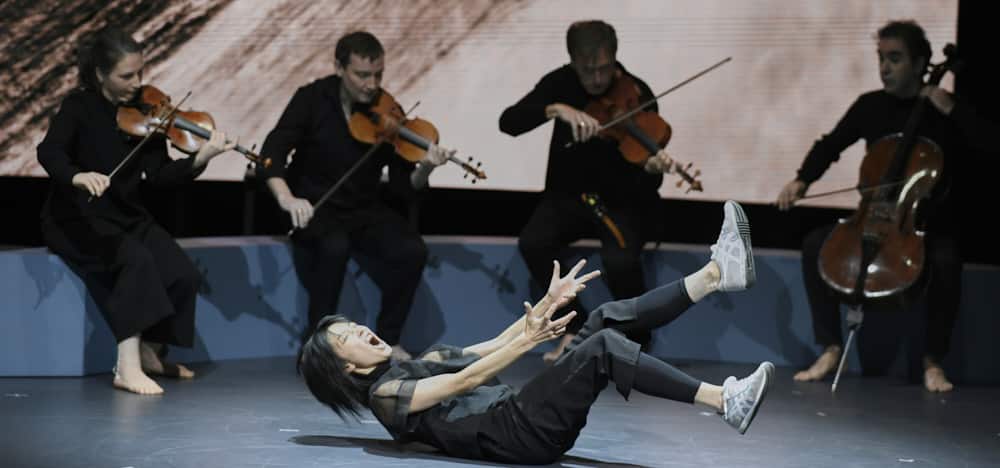
A Beethoven Project: On the occasion of the composer’s 250th birthday, Nico and the Navigators and the Kuss Quartet question the aesthetic and political constraints and freedoms in which Beethoven’s work was created.
“All my notes don’t get me out of trouble, and I write notes because of trouble quite generally.“ Ludwig van Beethoven
What does it mean to appropriate Beethoven’s last works with all one’s senses? How much courage does it take to get involved in strong emotions, pain and loss, longing and love, anger and hope? And how have these feelings changed in the here and now? How do they relate to our current experiences?
With the works Opus 59, No. 3 Finale, Dankgesang, Opus 135 as well as the Große Fuge, Nico and the Navigators, together with the Kuss Quartet, have set out on a search for traces of the composer’s 250th birthday – from historical sources to their own present.
The work, whose title “Force & Freedom” varies the motto borrowed from the fugue, “tantôt libre, tantôt recherchée” (“partly free, partly strict”), was overshadowed by a radical change of reality shortly after rehearsals began: Not only did the Corona Pandemic make it necessary to cancel the world premiere at the Schwetzinger Festspiele 2020, but the ensembles’ joint work was also unthinkable for the foreseeable future. Suddenly, the words force and freedom, which were originally meant to outline above all the coordinates in Beethoven’s life, became a direct experience for all those involved. How should dancers, singers, musicians and performers meet in the future in a confined space? How would the audience fit into such a situation?
It was not yet foreseeable at that time that almost all independent artists would be faced with the same economic constraints that once affected a composer like Ludwig van Beethoven himself. First and foremost, it was all about the hardly bearable distance, the isolation and prevention of work that was dependent on exchange.
Nico and the Navigators, together with the Kuss Quartet, made a virtue of this necessity by countering the threatening resignation with small messages from the shared present in the isolation.
The result was – a crisis diary in digital space, which in the end came together in a memory game as a lasting memory:
https://tagebuch.navigators.de/
Of course, all participants were painfully aware that these virtual encounters could not offer a full substitute for direct artistic exchange. But an example of insight regarding the necessity was provided by Beethoven’s String Quartet Opus 135, of all pieces. In the fourth movement, under the title “The Difficult Decision”, two motti are found there, which mark individual parts as a game between rebellion and surrender: Grave, ma non troppo tratto (“Must it be?”) and Allegro (“It must be!”).
So if “Force & Freedom” now takes on real form, this mixture of defiance and insight should be considered – not only with Beethoven in mind, but also as a field of tension in which our own contemporary society must constantly reorient itself.
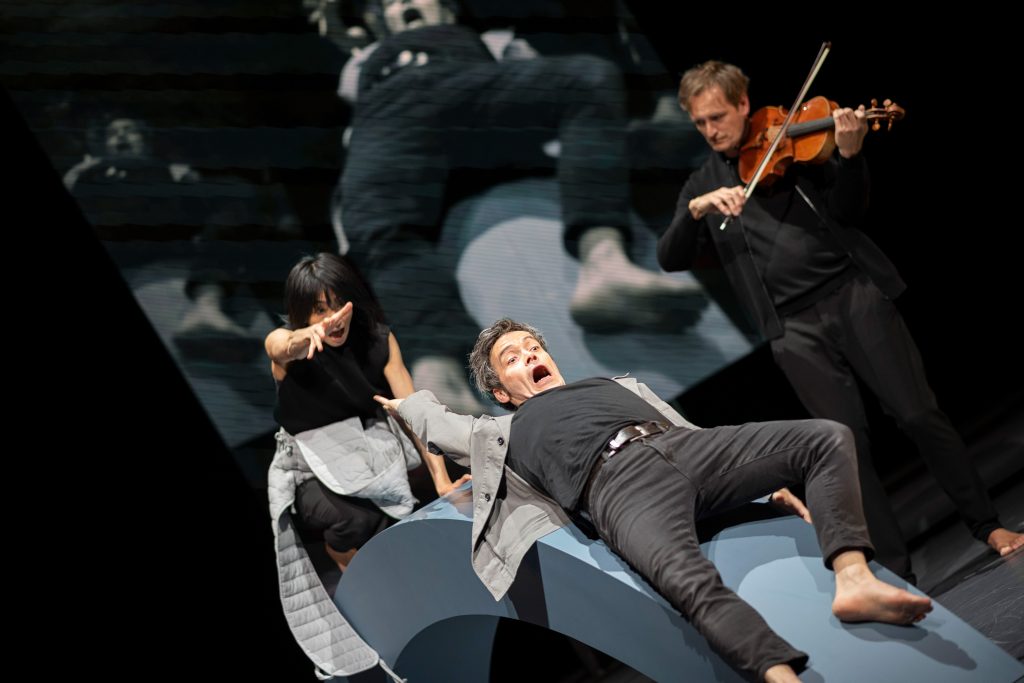
“Alternately, the audience heard excerpts from Beethoven’s string quartets and adaptations of song fragments by the composer. […] In combination with dance, songs and quotations, Beethoven’s string quartets appeared in a new light. […] The breathtaking movements of the dancer Kawaguchi made clear the ambivalence of the feelings inherent in the music. Despair, hope, lightness and melancholy alternated in short intervals. […] The crowning finale of the performance, the “Great Fugue” Opus 133, in which Beethoven repeatedly explodes the firmly established system of the fugue, was also in keeping with this. The audience was enthusiastic.”
"The concert evening with the Kuss Quartet and the music theatre ensemble Nico and the Navigators at the Rokokotheater in Schwetzingen was about inner longings and outer compulsions. [...] But the two ensembles did not merely pay homage to the old master in their elaborately choreographed performance. Rather, based on Beethoven's works, they dealt with the tense relationship between compulsion and freedom in the present day. [...] Alternately, the audience heard excerpts from Beethoven's string quartets and adaptations of song fragments by the composer. [...] In combination with dance, songs and quotations, Beethoven's string quartets appeared in a new light. [...] The breathtaking movements of the dancer Kawaguchi made clear the ambivalence of the feelings inherent in the music. Despair, hope, lightness and melancholy alternated in short intervals. [...] The crowning finale of the performance, the "Great Fugue" Opus 133, in which Beethoven repeatedly explodes the firmly established system of the fugue, was also in keeping with this. The audience was enthusiastic."
“Even if the traditions provide a rough picture of how and who this Beethoven might have been, the fragmentary and the associative seem to be the most suitable means of approaching the familiar stranger. […]
Yui Kawaguchi of the ensemble Nico and the Navigators lends the reflections that revolve around Beethoven and his time the depth dimension that consciousness cannot grasp. The expressive and not infrequently acrobatic choreographies of the Japanese dancer interpret Beethoven’s music as if it were a mirror of mental conditions. […] Is the human being nothing or everything? […]”
"Even if the traditions provide a rough picture of how and who this Beethoven might have been, the fragmentary and the associative seem to be the most suitable means of approaching the familiar stranger. And of course it is the music that vouches for the one from whom it originates.[...]
Integrated into the scenic stage action (directed by Nicola Hümpel), the gestural potential of this music also unfolds. [...]
Yui Kawaguchi of the ensemble Nico and the Navigators lends the reflections that revolve around Beethoven and his time the depth dimension that consciousness cannot grasp. The expressive and not infrequently acrobatic choreographies of the Japanese dancer interpret Beethoven's music as if it were a mirror of mental conditions. [...] Is the human being nothing or everything? [...]"
“The Kuss Quartet, one of the most renowned chamber music ensembles, and Nico and the Navigators, one of the most important free music theatre collectives from Berlin, take on Beethoven’s late works together within the SWR Festival. There is no need to fear that the music will be superficially illustrated by the actors of the free group. Rather, the performers “relate” to the music as if they were partners at eye level. […]
“For me it was surprising how sincerely human and touching these works are, beyond the usual titanic clichés. Some passages are heard quite differently today than they were two years ago – and in the face of external constraints, one thinks anew about inner freedom.” / Nicola Hümpel […]”.
"The Kuss Quartet, one of the most renowned chamber music ensembles, and Nico and the Navigators, one of the most important free music theatre collectives from Berlin, take on Beethoven's late works together within the SWR Festival. There is no need to fear that the music will be superficially illustrated by the actors of the free group. Rather, the performers "relate" to the music as if they were partners at eye level. Director Nicola Hümpel, who founded the theatre collective in 1998, invented this kind of staged concert and made it her trademark. Dance, movement and videos are elements that distinguish her works. Classically trained musicians who get involved in a collaboration with Hümpel leave the familiar ground of the concert podium: they too move freely on stage and thus have to play the works by heart. [...]
But the director also encounters the composers anew again and again in the intensive confrontation with the music. "For me it was surprising how sincerely human and touching these works are, beyond the usual titanic clichés. Some passages are heard quite differently today than they were two years ago - and in the face of external constraints, one thinks anew about inner freedom." / Nicola Hümpel [...]".
“a filmic-scenic search for traces, which in the poetry of minimalist abstraction and allusion repeatedly incorporates signs of pandemic presence … an eloquent approach to a music that is overshadowed by almost “sacred” seriousness without doing it violence … In any case, Beethoven’s late quartets have not been heard so intensely for a long time.”
Video on demand via ARTE Nico and the Navigators have a proven connection to the lighthouses of Western music history. Their specifically music-poetic mixtures of theater, dance and concert have already been the subject of Bach, Schubert and Mahler, among others. It was obvious to continue this tradition in 2020 and to dedicate oneself to the Bonn master of free musical art practice and his 250th birthday - like 99.9% of all culture creators. For this purpose, the brilliant musical abilities of the Kuss Quartet were assured, in order to theatrically circle the infamous late string quartets (and some songs) with them in the Navigators-familiar alliance of sound and movement, seriousness and play. After the canceled stage premiere and corona-induced restructuring, a "Staged Concert" was devised, first realized at Radialsystem on December 21 and available on Arte for another month. Under the (particularly virulent) tension between constraint and freedom, excerpts from the quartets op. 132, op. 135 and, of course, the visionary "Grosse Fuge" were examined for their existential potential under the proven direction of Nicola Hümpel; a cinematic-scenic search for traces that, in the poetry of minimalist abstraction and allusion, repeatedly incorporates signs of the pandemic present. There are ravishing choreographies by dancer Yui Kawaguchi, endearingly melancholic song adaptations by Ted Schmitz, or the incorporation of Beethovenian words and ideas by actor Patrick Schott. All this is not quite as complex and sadly funny as one is used to from the Navigators, but it is an eloquent approach to a music that is overshadowed by almost "holy" seriousness without doing it violence. The real protagonist is the Kuss Quartet, which is astonishingly accurate in all scenic situations. Beethoven's late quartets have not been heard so intensely for a long time...
“Even in this late stage, it’s still about these classical contrasts that Beethoven differentiated very finely and infinitely. And this theatre collective now uses this to make listening visible with scenic means … a very multi-layered picture that can be interpreted in many ways, but always related to Beethoven, and that is pretty strong!”
Right now, at this hour, a film is being put online for the first time, all about the great jubilarian of this year, Ludwig van Beethoven. "Force & Freedom" - Beethoven between compulsion and freedom, that's the title. And it's about experiences from back then and in the here and now. The premiere was planned for the 2020 Schwetzingen Festival, but had to be canceled. Coercion and freedom thus became a direct experience for everyone involved. Matthias Nöther has already had the opportunity to see the film this afternoon. Now he is joining me. Good evening, Mr. Nöther! Matthias Nöther: Good evening, Mr. Vratz. Christoph Vratz: Yes, now that the actual day of Beethoven's birth and baptism has passed, was that another really great moment? This film in what is basically really not a smooth Beethoven year. MN: Yes, the Beethoven year was not smooth because we had the Corona pandemic. It had less to do with Beethoven himself. This state of affairs preoccupies the whole of society, and it would be strange to assume that a currently working theater collective like Nico and the Navigators would not be preoccupied by it. Especially since this motto "Between constraint and freedom" - the title of the production - can definitely be applied to Corona and not only to Beethoven. So we all have had enough constraints this year. And some think they have also gained new freedoms as a result; not all, of course. So: Was there this reference to Corona is the question? You have to answer that clearly in the affirmative. There was this reference in this new film production by Nico and the Navigators, and you can understand that quite well in one of three songs that were also played in this evening otherwise dominated by string quartet sounds. The song is called "Resignation" by Beethoven, is from the year 1814 and we can listen to it briefly. It is sung by the tenor Ted Schmitz. - Ted Schmitz - "Resignation" MN: Yes, you have to say that in this evening, which is also carried by performers, there is a preface by this tenor to this song, where he asks very provocatively that there are so many ways to exude. Like this flame that is mentioned in the song. Nowadays there are digital ways. So if the flame has no more oxygen in one place, then it can spread out and go in other directions. And so the digital nomad of today could also - he says quite arrogantly - go anywhere and keep his light burning everywhere. And it has to be said quite clearly, and this is made a bit negative by the fact that it is charged and causes contradiction, this speech of the tenor, it has to be said that this does not apply to all people. Many people have the need to meet people face to face, to feel human touch. And this arrogant gesture was of course also the gesture of Beethoven, who thought he didn't need all that. And Nico and the Navigators is very much in opposition to this. And that is, for example, a moment where Corona is very present as a social grievance or condition, and yet this relationship to Beethoven is built up. HF: Now the Kuss Quartet is also involved and plays - predominantly, let's say - works from Beethoven's late phase. These are relatively unwieldy pieces that have always puzzled many listeners and still do. They have little to do with the Beethoven of the middle or early phase, or only to a limited extent. How is this program of the film arranged? Is this late phase isolated, a truncated episode, or is it somehow visible with direct reference as having grown out of the middle phase? MN: It's actually the case that a Razumovsky quartet - a movement from it - is also played. So this very symphonic grandeur, which is no longer there in the late work. But one must also say that the late works also have light features. Not everything is always difficult and complicated. At least not everything always sounds complicated. Even in this late phase, it's still about these classical contrasts, which Beethoven simply differentiated very finely and infinitely. And this theater collective is now using this to make it visible, to make it scenically visible, and in part not to convey any great messages to the listener, but simply to make hearing visible with scenic means. This dancer, who is always with Nico, Yui Kawaguchi, who makes this constraint and this contrast of freedom very much visible in the pieces, through very strong, powerful arm movements, and very soft movements of the arms. The arm, the hand, as a symbol for having everything firmly under control. Another scenic device that is omnipresent is the see-saw, a blue see-saw that is set in the otherwise black stage landscape. This seesaw as an antithesis between compulsion and freedom, that sometimes gives incredibly strong images, when then a metronome is set up on this seesaw, an instrument that also expresses compulsion in music, but then is also supposed to enable freedom. This metronome then falls down when this seesaw eventually teeters. This is, of course, a very complex image that can be interpreted in many ways, but always related to Beethoven, and that is already strong! Partly really great messages on this evening, but partly also that you give the listener something to see as an aid. HF: Finally, the question: who is this film aimed at, at Beethoven connoisseurs or is it something for everyone who doesn't know this prehistory, as you have just described it? MN: Well, you don't really have to have more than an affinity for classical music, be somewhat familiar with the canon of gestures, and perhaps you should also have a certain affinity for music theater and theater. That's where Nico and the Navigators come from. They've been doing staged concerts for a long time, that is, concerts that have been put on stage and are not musical theater, and they have a lot of experience there. So you don't have to be able to decipher big codes like I touched on here, you don't have to. But you do have to, or you should be prepared to be able to appreciate a very stringent dramaturgical idea, as it is shown here, with a consistent formulation of constraint and freedom.
“Music and theatre and dance and performance, the stage works of Nico and the Navigators are usually image-saturated and thought-space-opening productions in which it all flows into each other. You marvel and get smart while watching.”
Music and theater and dance and performance, the stage works of Nico and the Navigators are usually image-saturated and thought-space-opening productions in which all of this flows into one another. One is amazed and looks at oneself smartly. Of course, Nicola Hümpel and her company also wanted to join in the commemoration of Ludwig van Beethoven's 250th birthday - but, well, it all turned out differently this year. "Force & Freedom" is the name of the project idea with the Kuss Quartet. External constraints and internal freedoms in Beethoven: that was the motto, which now unintentionally also fits the Corona year. The premiere and performances at the Berlin radialsystem are cancelled; but the stage project has now become a film, which will be shown tonight on ARTE Concert. Frauke Thiele was there during the filming. FT: There are no audience seats in the Great Hall. Instead, there is a large podium with screens, mixers and cables. Incredible concentration and also euphoria can be felt. Collaborate. Finally. Camera, lighting, stage, costume, direction, etc. Everyone wears FFP2 masks; except the artists on stage. Everyone is tested - every day anew - just no risk. NH: "We couldn't have imagined how severe everything would get and how blatant this pandemic would be for the artistic scene as a consequence. That's why, of course, this piece is insanely existential for us. Because Beethoven also had this terrible situation of being in constraints, concerning his deafness; although he loved the sociability. This being deprived of people and not being able to share art together, that's terrible, and of course we know that now in the first place. FT: Nicola Hümpel is a director and the brains behind Nico and the Navigators. This is her first time directing the film. To make sure everything works, she brought in an experienced colleague. They spent days in video conferences discussing how they could bring the staged Beethoven concert "Force & Freedom" into a film language at such short notice. Today, the four musicians of the Kuss Quartet and the dancer Yui Kawaguchi perform the first and second movements of Beethoven's String Quartet Opus 135 - his last work. Several times in a row, each scene, they play for the camera. Until it fits. Almost like a CD production. Oliver Wille from the Kuss Quartett: "What's new is that we are also seen. And that the interpersonal actions we've come up with, that they really have to be played every time, just like the instrumental stuff, as ready for recording as possible. The musicians sit barefoot on a kind of reclining half-moon, later they also stand on it, like on a seesaw. The dancer Yui Kawaguchi prances into the hall, then twists her arms, as if tied behind her back. Suddenly, a flirtatious wave in the direction of the musicians. Movements, like states of emotion, change incessantly, as in the music of Beethoven. OW: When we play without Yui, we now always have Yui in mind, and since then we play this work in a more speaking way, even more rhetorically. Which is incredibly beneficial to this music. FT: Nicola Hümpel sits in front of the hall in front of large screens with different camera settings. She gives the instructions for the camera on the crane through the microphone. The camera on the crane follows the dancer in close-up as she sneaks around the musicians and suddenly jumps forward between them, circling around her own hands on the floor in a breakdance-like manner. NH: We are currently trying to make the music more listenable. With the necessary fun, but also with the necessary abysmal depth. And the experiment, of course, is always to try not to image it, but to create a dialogue between the body and the musicians. And also the musicians move freely, play by heart, which is anything but easy with these insanely heavy works. But because of that, it lives differently and grasps space in the 21st century. FT: The cameras capture everything. The bare feet from the Kuss Quartet. The dancer silently screaming out her agony. The musicians finally bobbing on the crescent moon as they play. All Beethoven. Tomorrow, the dancer will be joined by a performer and a singer - word quotes from Beethoven, also little song fragments, live and from the video screen, electric guitar - very subtle. NH: Well, we don't want to chip him (Beethoven). But we are also allowed to think of him in today's context, in terms of current feelings and contemporary aesthetics. OW: That is the great art that these composers understood - and Beethoven in particular. They are so strong in themselves, by their nature, that they actually embody everything that being human means.
“In any case, the extraordinary music theatre production “Force & Freedom” can be experienced on television … In the process, they embark on a search for clues to the history of reception that begins with historical sources and ultimately leads to the present.”
The meeting of the prime ministers at the end of November will decide whether theaters will play again in December and thus Nico & The Navigators will be allowed to perform their Beethoven homage live at the Radialsystem. In any case, the extraordinary music theater production "Force & Freedom" can be experienced on television. The title means "freedom and force" in German - the terms mark the poles between which Ludwig van Beethoven moved. His later works in particular go beyond the musical conventions of the time. In their music theater piece premiered in Schwetzingen, Nico & The Navigators and the Kuss Quartet deal with Beethoven's trend-setting chamber music. In the process, they embark on a search for clues to the history of Beethoven's reception, beginning with historical sources and finally leading to the present day. From Mon, Dec 21, 8pm, Arte
“This digital diary cannot and should not replace what has been lost, it is also something like an artistic mourning work with many facets.”
Nico and the Navigators" and the Kuss Quartet have moved their Schwetzingen Beethoven project online. The first collaboration was "Muss es sein" 2018. "Force & Freedom" should now, as a "Staged Concert", according to the will of those involved, place the "music in the field of tension between external constraints and inner freedom", in which "Beethoven had to move and assert himself throughout his life". The result was to be a dialogue between dance, movement and light. Beethoven was to be played by the Kuss Quartet, which had just presented his string quartets in a CD production on Rubikon Classics. Among other things, Beethoven's String Quartet op. 135 was to be heard for "Force & Freedom." "It must be," which Beethoven wrote about a movement from it, was to provide an important anchor point for the performers. Autonomy and constraint should have been the two poles of the premiere, in which the Kuss Quartet would also have been scenically involved. Digital crisis diary The Corona crisis prevented the project, as well as the entire festival, from taking place; the premiere is to be made up for in 2021. Now "Nico and the Navigators" have reacted artistically to the situation with a digital crisis diary consisting of 29 video clips showing the personal sensitivities of the isolated members, their confrontation with the oppressive situation, and at the same time Beethoven's music. The group was founded in 1998 by Nicola Hümpel and Oliver Proske at the Bauhaus in Dessau. Until 2006 they were "artists in residence" at the Sophiensälen in Berlin. With "Eggs on Earth" the troupe was nominated for the Berlin Theatertreffen in 2000 and achieved an international breakthrough. In 2006, the company began to explore musical theater with projects based on Schubert, Handel, Bach, Purcell, Rossini and Mahler; in 2014, "Die Befristeten" was conceived with composer Detlev Glanert for the Munich Biennale. Philipp Boesman's "Reigen" followed for the Stuttgart State Opera. They countered the now somewhat loosening compulsion to isolate themselves throughout April with their Internet project, which is based in part on the preliminary work for "Force & Freedom". In contrasting video clips, the question of the stage project is related to the current situation posed by the coercive measures of the Corona crisis, reflected upon and commented on artistically. "Free and unbound" The interaction with the partners and the audience, which is no longer possible, is to be processed in this way, the longing, for what has been lost through the crisis, the common experience and reaction, commented on and accentuated. The motto of the first printed edition of Beethoven's "Grosse Fuge": "tantôt libre tantôt recherchée" ("free and bound") thus unintentionally takes on a very current meaning for the music theater group from Berlin. For the video clips, the already mentioned complete recording of the Beethoven quartets by the Kuss Quartet forms the inspiring musical basis. This digital diary cannot and should not replace what has been lost, it is also something like an artistic mourning work with many facets. At the end of this Internet video project there is now an extraordinary memory game, the parts of which have to be put together from a selection of the total of 29 clips. Freedom and constraint (of the rules) once again refer to the basic constant of the "Force & Freedom" project now planned for 2021.
“Diary Meets Memory … A Refreshing Video Project in Times of Streaming Flood”.
Concept programs with a common thread - that is the trademark of the Kuss Quartet. The latest idea: a Beethoven program that transcends genre boundaries, exploring the field of tension between external constraints and inner freedom, exploring the contrast between desire and reality in which the composer moved throughout his life. The string quartet will be joined by the Berlin music theater ensemble "Nico and the Navigators," with whom the quartet had already collaborated on its "Muss es sein" project. Actually, the co-production "Force and Freedom" directed by Nicola Hümpel would have celebrated its premiere at the Schwetzingen Festival in May, but due to Corona it had to be postponed until 2021. This was followed by the transformation into a digital diary project, which is an immediate reaction to the new situations we encounter in the Corona pandemic. Music is made from isolation, without feedback from an audience. This is done in "Force and Freedom" with small clips that show unusual and varied scenes: There are burning notes, highway bridges, cats playing with metronomes, and other bizarrenesses - all of this underpinned by the Kuss Quartet's recording of Beethoven's quartets (recently released on the Rubikon Classics label). The sum of the 29 diary entries adds up to the whole, and a playful memory beckons at the end. A refreshing video project in times of streaming flood.
“The group of singers, dancers and actors had already rehearsed together for two weeks. Now they all stay at home – and still continue the creative process.”
Canceled performances and an uncertain future: Berlin's independent scene has been hit particularly hard by the Corona crisis In March, Berlin-based dancer and choreographer Yui Kawaguchi was still in France rehearsing her new piece, which combines elements of Japanese No Theater with contemporary dance. The world premiere of "Mugen" was to take place on April 1 at Berlin's Sophiensaele. Kawaguchi was setting up the lights when the artistic director of the Montbéliard theater told her to leave quickly because the border to Germany would be closed the next day. Kawaguchi and lighting designer Fabian Bleisch quickly bought provisions, then drove to Berlin by car and immediately went into domestic quarantine. Kawaguchi trained in her living room, but at the end of the 14 days, she says in a telephone interview, she felt as if she were wrapped in absorbent cotton and was running out of breath. On the day the quarantine was over, it snowed for ten minutes. Kawaguchi immediately ran to the roof of her apartment building and danced with the snowflakes. She posted the video on Facebook. "I felt completely connected to the moment," she says, describing her feeling of happiness. She hopes to show "Mugen" later this year. It's not the only one of her projects that has had to be canceled for now because of the Corona pandemic. Kawaguchi, who has lived in Berlin since 2005, has a close collaboration with the group Nico and the Navigators. Their Beethoven project "Force and Freedom" was to premiere on May 1 at the SWR Festival in Schwetzingen. The group of singers, dancers and actors had already rehearsed together for two weeks. Now they are all staying home - and still continuing the creative process. "I am grateful to be here" "We continue to work individually, collecting material and sending Nico little videos," Kawaguchi says. The Navigators are happy to continue working. Contractually, they were guaranteed 80 percent of the regular rehearsal fee. But the fees from guest appearances are falling away. In order to make ends meet, Kawaguchi applied for emergency aid from the Investitionsbank Berlin. After just a few days, the 5,000 euros were in her account. "I am grateful to be here," says Kawaguchi. In Japan, she says, it is much more difficult for artists to survive financially. Other Berlin dance artists have also benefited from the emergency aid. Nevertheless, the Corona crisis is hitting freelance dancers and choreographers particularly hard. They were already working under precarious circumstances anyway, report Moritz Majce and Kasia Wolinska from the board of the "Contemporary Dance Berlin" association. The two experience the fears and worries of their colleagues very directly. With the money from a donation, they started the peer-to-peer project to support dance professionals in need. Anyone who offers help to a colleague, for example in applying for funding, receives 50 euros in return. It's just a drop in the bucket, but it's an important signal that holds the scene together. Michael Freundt, the managing director of Dachverband Tanz Deutschland, is also experiencing a great deal of uncertainty. Together with the Baden-Württemberg dance scene and the dance offices in Berlin, North Rhine-Westphalia and Munich, the umbrella organization has conducted a nationwide survey on the loss of income in the dance sector. More than 600 tables were evaluated: "We reckon with more than 130 million euros in lost revenue for independents, ensembles, schools and institutions in the dance sector alone."
“In short, fast or meditative clips, which are based on the complete recording of all Beethoven string quartets published by Rubicon Classics, individual miniatures of the artists are assembled, which store as a growing digital diary, small memories like time capsules or reminiscences of the common present in the current isolation.”
Together with the Kuss Quartett, the ensemble Nico and the Navigators wanted to bring a contribution to the Beethoven Year 2020 to the European music stages: under the title Force and Freedom, they wanted to " explore the music in the existential field of tension between external constraints and inner freedom with its indissoluble opposition of subjective desire and objective reality, in which Beethoven had to move and assert himself throughout his life. " The premiere was to take place on May 1, 2020 as part of the Schwetzingen SWR Festival, with further performances planned for the Kissinger Sommer, the Konzerthaus Dortmund, BOZAR Brussels and the radialsystem Berlin, among others. On March 18, 2020, rehearsals had to be canceled at the Ufer Studios in Berlin, and the premiere on May 1, 2020 has been canceled along with the entire Schwetzingen Festival and has since been rescheduled for next year. The other dates are also to be made up next season. At the beginning of April, however, an Internet project was initiated that is based on the work on Force and Freedom and that, in addition to the questions posed there, also negotiates the current limitations of life. In short, fast or meditative clips, which are based on the complete recording of all Beethoven string quartets by the Kuss Quartet published on the Rubicon Classics label, individual miniatures of the artists are assembled, which store small memories like time capsules or reminiscences of the common present in the current isolation as a growing digital diary. " It is a technique beyond the usual streaming: the choice of pieces and the editing of the scenes put the snapshots into context and develop a whole from fragments, a digital staging. This method, however, is not able to replace the physical communal experience of a performance. Rather, the work is an expression of the individual's longing for each other, which should be preserved as a lasting experience from this crisis. » The individual sequences can already be followed on social media. At the end of this path awaits an extraordinary memory game, whose parts can be assembled from a selection of the total of 29 clips. If solved correctly, there is the possibility of winning tickets to future physical performances of "Force and Freedom".
A production of the Schwetzingen SWR Festspiele and Nico and the Navigators funded by the Berlin Senate Department for Culture and Europe. As part of "BTHVN 2020 - nationwide", funded by the Federal Government Commissioner for Culture and the Media. Co-produced by the Konzerthaus Dortmund. In cooperation with the radialsystem.

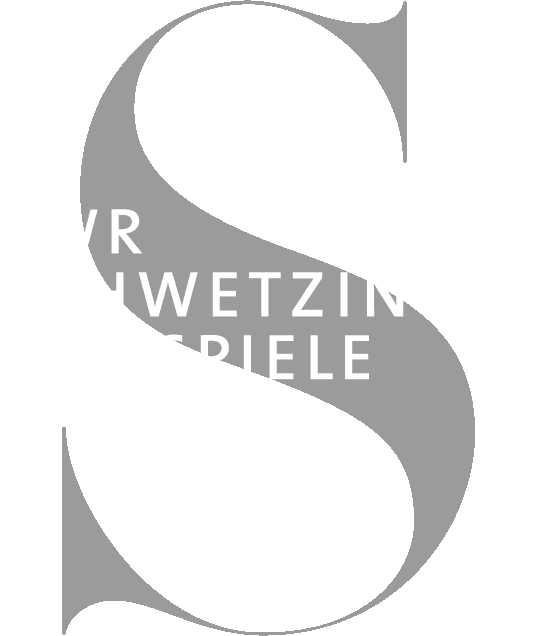


Tickets for this date are not available yet. Leave your mail adress to get notified when tickets are available.